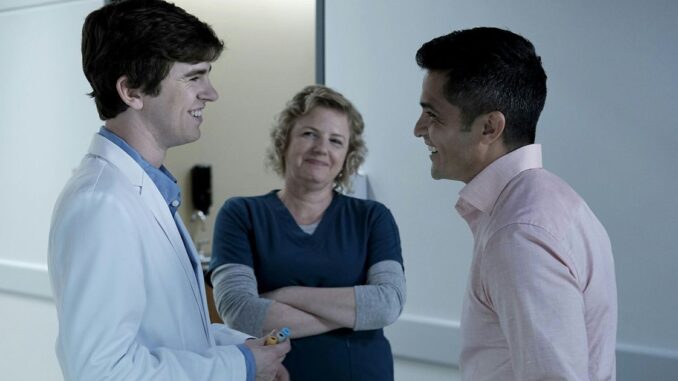
The Good Doctor has achieved something few medical dramas have in recent years—it built a devoted global fan base, generated important conversations about neurodiversity, and turned Freddie Highmore’s performance as Dr. Shaun Murphy into a cultural touchstone. And yet, for all its success, the show has never truly made a mark at the Emmys.
How could a series that consistently delivers strong ratings, emotional storytelling, and powerful performances remain overlooked by television’s most prestigious award ceremony? The answer lies not in its lack of quality—but in the complicated nature of awards politics, genre bias, and a changing entertainment landscape.
A Heartfelt Success Story
When The Good Doctor first premiered on ABC in 2017, few expected it to become a breakout hit. Based on a South Korean series of the same name, the show follows Dr. Shaun Murphy, a young surgical resident with autism and savant syndrome, as he navigates the high-stakes world of medicine while facing constant challenges due to his neurological condition.
Led by a sensitive and layered performance from Freddie Highmore, the series struck a chord with viewers worldwide. Its mix of emotional depth, medical intrigue, and inclusive storytelling made it a weekly staple for millions.
The show has run for several successful seasons, created meaningful arcs for its ensemble cast, and tackled everything from hospital bureaucracy to personal trauma, grief, and ethics in medicine.
Freddie Highmore: Critically Acclaimed, But Undervalued
At the center of The Good Doctor’s appeal is Freddie Highmore. His portrayal of Dr. Shaun Murphy is nothing short of remarkable—nuanced, emotionally resonant, and incredibly detailed. Highmore not only stars in the series but has also directed and written several episodes, further cementing his creative investment.
Critics have praised his performance since the beginning. He’s been nominated for several awards, including the Golden Globes and Critics’ Choice Awards. But one glaring omission remains: an Emmy nomination.
It’s a surprising snub, especially when you consider the complexity of the role. Highmore has had to portray a character whose worldview, speech patterns, social cues, and reactions differ drastically from the neurotypical norm—all without ever tipping into stereotype or insensitivity. It’s a masterclass in subtle acting.
So why no Emmy love?
The Emmy Voter Bias
One of the biggest challenges for The Good Doctor lies in its genre. The Emmys have a long history of favoring certain types of shows—particularly dark prestige dramas (Succession, Breaking Bad, The Crown) or highly stylized comedies (Ted Lasso, Fleabag, Barry).
Network dramas, especially medical ones, often get pushed to the sidelines in favor of streaming and cable content. Shows like Grey’s Anatomy also found themselves ignored by the Emmys after their early years, despite massive cultural impact.
The Good Doctor is earnest, heartfelt, and emotionally accessible—qualities that make it beloved by audiences, but sometimes undervalued by critics and award voters seeking what they perceive as more “cutting-edge” television.

A Medical Drama in a Crowded Field
Another factor working against The Good Doctor is the crowded field of quality TV. With the explosion of content across platforms like Netflix, HBO, Hulu, and Apple TV+, there are simply too many contenders each year.
Voters are more likely to choose shows that create buzz or headline-grabbing narratives—think Euphoria, The White Lotus, or Better Call Saul. Even when The Good Doctor delivers compelling episodes or introduces socially relevant storylines (like the COVID-19 response, disability rights, or mental health), it doesn’t generate the same viral attention.
In a world where attention spans are shorter and Emmy voters are inundated with screeners, buzz often outweighs consistency.
A Quiet Revolution in Representation
Perhaps the most frustrating aspect of The Good Doctor’s Emmy snubs is the lack of recognition for its cultural impact. The series has been a game changer in terms of representation of autism on television. Shaun Murphy is not a side character or a quirky genius in the background—he is the lead, the emotional core, and the hero.
The show treats autism with empathy and care, not only by highlighting Shaun’s strengths but also by honestly showing his struggles. It avoids making his condition a gimmick. Instead, it challenges stereotypes and invites viewers into his perspective.
In a world still grappling with how to portray neurodiversity on screen, The Good Doctor has set a new standard. That achievement alone deserves recognition from award bodies that claim to champion progress.
Despite the lack of Emmy accolades, The Good Doctor remains a critical success where it matters most: in the hearts of its viewers. The show has inspired countless fans, especially those in the autism community and their families, who finally see themselves represented with dignity.
It has sparked necessary discussions in schools, hospitals, and homes. It has proven that you don’t need to be edgy or cynical to matter. Sometimes, compassion is enough.
The show has also opened doors for more inclusive storytelling in network television. Its success could be a key reason why spinoffs like The Good Lawyer—featuring characters with OCD—are getting greenlit. That legacy is far more enduring than any trophy.
